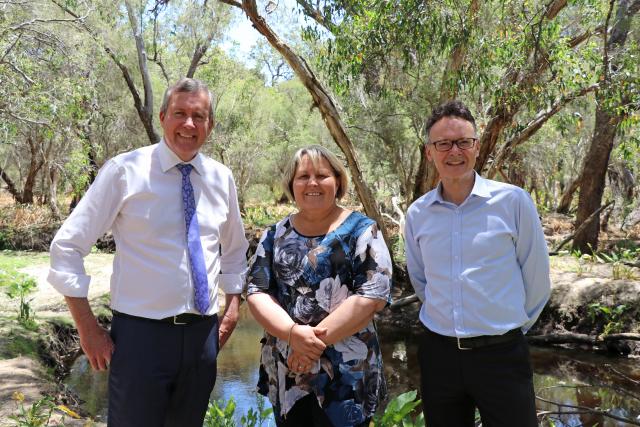Work has leaped ahead as part of a four-year management plan for the reserve where the Southern and Canning rivers meet in the City of Gosnells, with effects expected to flow downstream.
Five hectares of previously weed-choked bushland and wetland areas were revegetated last winter and spring, and the announcement in December of $250,000 in funding for the project from the Department of Biodiversity, Conservation and Attractions Swan Canning Riverpark Urban Forest Program will keep the momentum going.
City of Gosnells Mayor Terresa Lynes said rehabilitation of the total 10-hectare site, known as the Southern and Canning River Confluence Foreshore Reserve, will be crucial to river health and local ecosystems.
“Ultimately, the City would like this extensive reserve to be a natural environment filled predominantly with native vegetation that provides habitat to native wildlife, tolerates varying water levels and resists weed invasion,” she said.
“The Southern and Canning rivers are significant to the City of Gosnells. Rehabilitating this site will improve the quality of water entering the Canning River, which in turn flows into the Swan River.”
The reserve contains Bush Forever sites, however weeds of national significance were found in the reserve, including lantana and blackberry, as well as declared pest species such as arum lily and narrow leaf cotton bush.
The four-year management plan will be run by the City in partnership with the Department of Biodiversity, Conservation and Attractions; the Department of Planning, Lands and Heritage; and the Armadale Gosnells Landcare Group.
“The Marri, Swamp Paperbark and Flooded Gum woodlands at this site are home to Forest Red-tailed Black Cockatoos, Brushtail Possums, South-western Snake Necked Turtles and Quenda, among many other valuable native species, which will benefit from rehabilitating the area,” Mayor Lynes said.
“Carter’s Freshwater Mussels have also been recorded upstream of the site in the Canning River and, by improving the quality of the water where the Southern and Canning rivers meet, we also hope to see a great improvement in the health and diversity of native species in the river.”

















